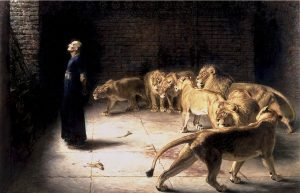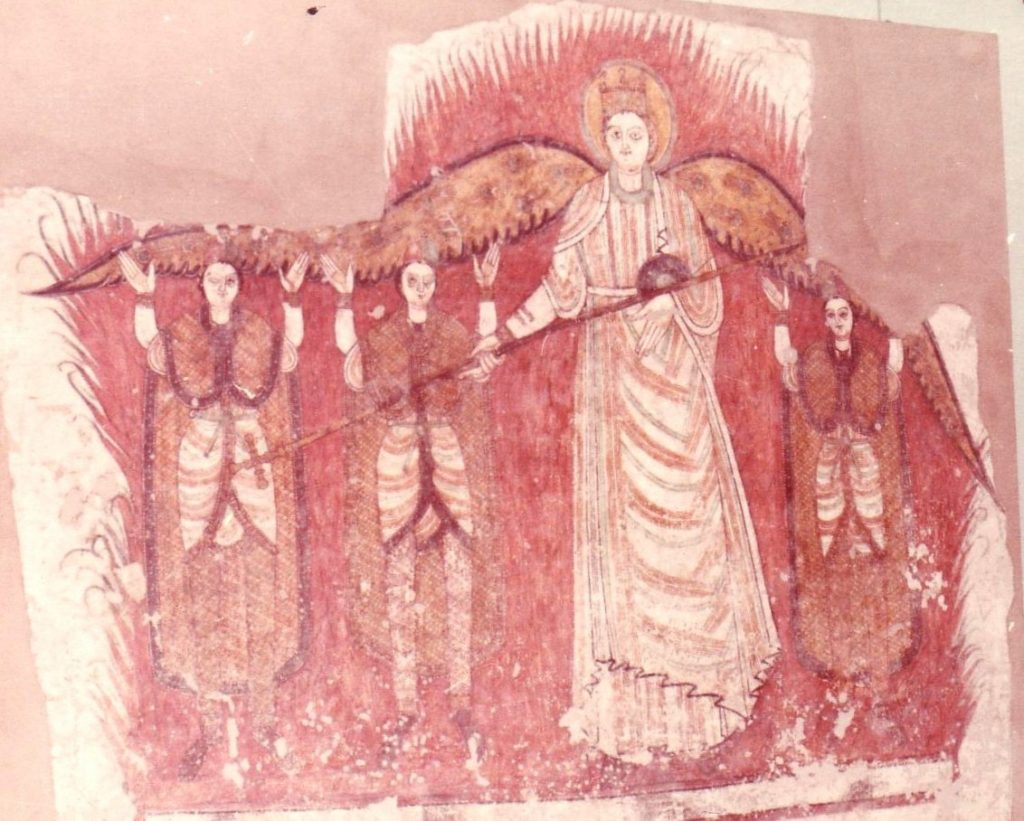
530 BC to 510 BC, Psalm 21: Daniel
This site was first built in French (see www.147thgeneration.net). The English translation was mainly done using « google translation ». We have tried to correct the result of this translation to avoid interpretation errors. However, it is likely that there are unsatisfactory translations, do not hesitate to communicate them to us for correction.
(for that click on this paragraph)
Summary
This generation is from the years 530 BC to 510 BC
According to our count, this generation is the 21st generation associated with Psalm 21. It is in this Psalm 21 that we therefore find an illustration of the facts of this generation.
This generation is that of the end of the reign of Cyrus and the beginning of the reign of Darius. Cyrus had allowed the Israelites to restore the altar of the Temple of Jerusalem and lay the foundations. The rebuilding of the Temple proper is only done during the reign of Darius between 520 BC and 515 BC, during the generation of interest.
It is thus during this generation that the period of seventy years of unemployment of the land announced by Jérémie ends. This period began with the assault of Nebuchadnezzar against Jerusalem and the destruction of the Temple. This period ends logically on the reconstruction of the Temple, the land has been purified by a complete rest.
Since the exile in Babylon, the neighboring populations, those mentioned by Zechariah (through the angel of the Lord) had become accustomed to the absence of the people of Israel on their land. They saw with dismay the return of the latter and also feared that the people of Israel would be able to rebuild the destroyed Temple. Darius rejects their opposition by extracting from the archives a decree from Cyrus confirming the permission of the Jewish people to rebuild the Temple. It is therefore under Darius that the Temple will be rebuilt and inaugurated.
This opposition of the neighboring peoples against the people of Israel with regard to the building of the Temple, and therefore over the essence of their faith and practice towards God, is also symbolized by the account of Daniel.
Daniel’s enemies manage to get Darius to sign an ordinance prohibiting all religious practice outside the cult due to King Darius, and ordering that any offender be thrown into the lion’s den. And of course, Daniel, continuing his worship to the Lord is denounced to the king so that he is put to death. Darius reluctantly confirms the sentence while hoping that the Lord will intervene to spare Daniel. Hope answered: God makes Daniel spared by lions. Following this miracle, King Darius inflicts just punishment on those who initiated the plot against Daniel.
Talk
Darius
This generation is that of the end of the reign of Cyrus and the beginning of the reign of Darius. Cyrus had allowed the Israelites to restore the altar of the Temple of Jerusalem and lay the foundations. The rebuilding of the Temple proper is only done during the reign of Darius between 520 BC and 515 BC, during the generation of interest.
It is thus during this generation that the period of seventy years of unemployment of the land announced by Jérémie[1] ends. This period began with the assault of Nebuchadnezzar against Jerusalem and the destruction of the Temple. This period ends logically on the reconstruction of the Temple, the land has been purified by a complete rest.
God can unite again to this earth because his period of impurity has passed, as the husband can once again unite with his wife when his period of impurity is over.
This is what Zechariah expresses in particular (Zechariah’s prophecy is contemporary with the reign of Darius):
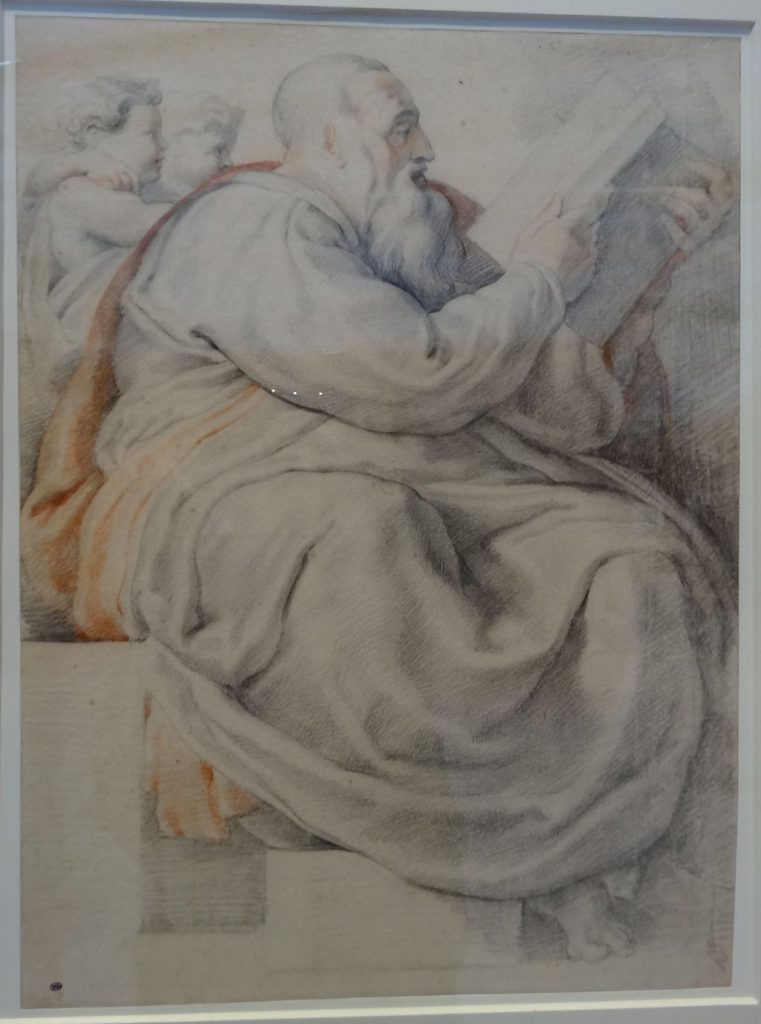
- And[2] the angel of the Lord replied and said, « O Lord of Hosts! How long will You not have mercy on Jerusalem and upon the cities of Judah, upon whom You are wroth for seventy years already? »
- And the Lord answered the angel who was speaking to me, good words-yea, consoling words.
- And the angel who was speaking to me said to me, « Proclaim, saying: ‘So said the Lord of Hosts, I am jealous for Jerusalem, and for Zion-great jealousy.
- And I am very angry with the nations that are at ease, for I was wroth a little, and they helped to do harm.’
Opposition to the reconstruction of the Temple
Since the exile in Babylon, the neighboring populations, those mentioned by Zechariah (through the angel of the Lord) had become accustomed to the absence of the people of Israel on their land. They saw with dismay the return of the latter and also feared that the people of Israel would be able to rebuild the destroyed Temple.
Thus following the laying of the foundations, as the book of Ezra indicates:
- Now[3] the adversaries of Judah and Benjamin heard that the people of the exile were building a Temple for the Lord God of Israel.
- And they approached Zerubbabel and the heads of the fathers’ houses and said to them, « Let us build with you, for like you we seek your God, and we have been sacrificing to Him since the days of Esarhaddon, the king of Assyria, who brought us up here. »
- And Zerubbabel, Jeshua, and the rest of the heads of the fathers’ houses of Israel said to them, « It is not for you and for us to build a House for our God, but we ourselves shall build for the Lord God of Israel, as King Cyrus, the king of Persia, commanded us. »
- And the people of the land were hindering the people of Judea and frightening them from building.
- And they would hire advisors against them to frustrate their plan, all the days of Cyrus, the king of Persia, and until the kingdom of Darius, the king of Persia.
- And in the reign of Ahasuerus, in the beginning of his reign, they wrote an accusation against the dwellers of Judea and Jerusalem.
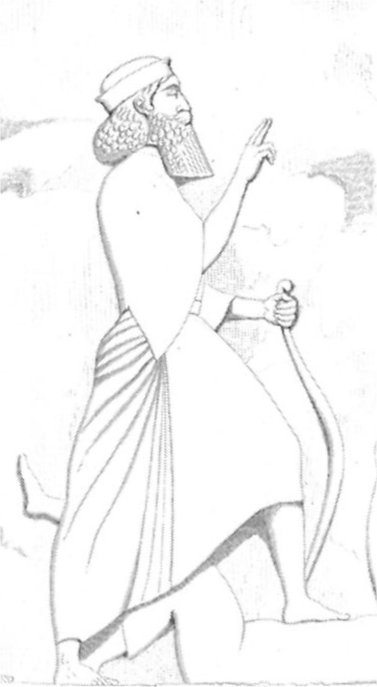
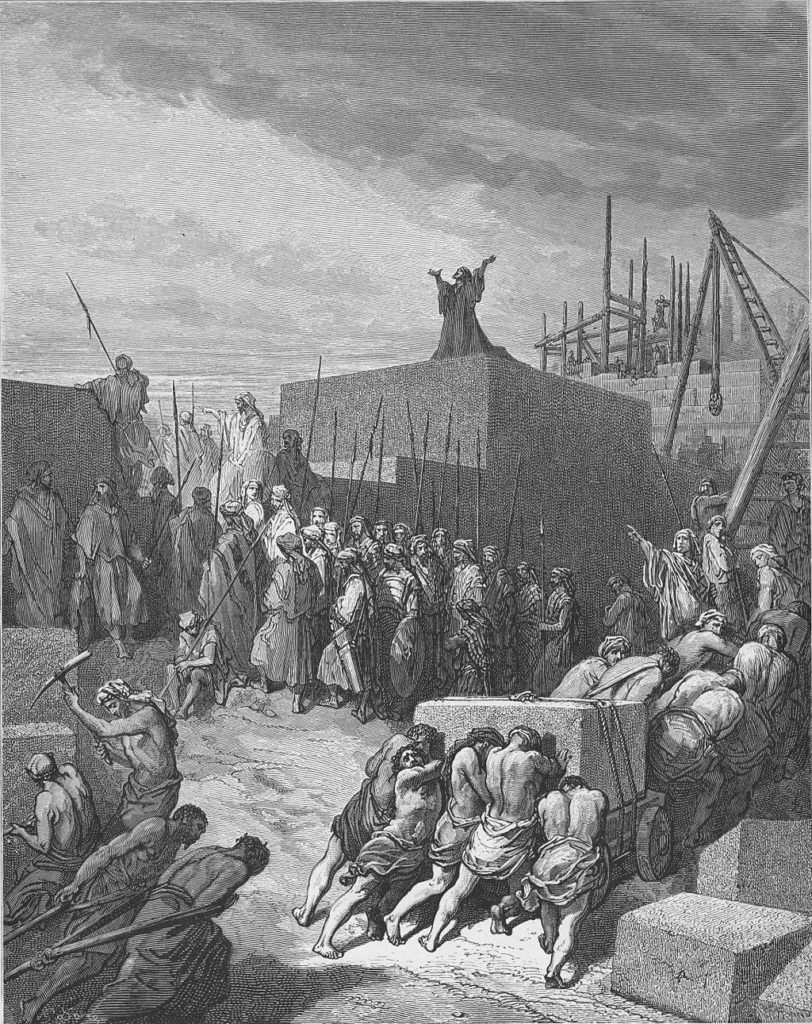
Reconstruction of the Temple
The rest of the book of Ezra (up to chapter VI) seems to introduce the Persian ruler Artaxerxes too soon. Indeed, the character of Ezra only appears during the latter’s reign. However, Chapter VI takes us back to the reign of Darius. And it is moreover Darius who, in the remainder of the text[4], deals with the written accusation of the inhabitants of Judah and Jerusalem. Darius emerges from the archives a decree of Cyrus confirming the authorization of the Jewish people to rebuild the Temple. It is therefore under Darius that the Temple will be rebuilt and inaugurated:
- And[5] the completion of this House was on the third day of the month of Adar, which was in the sixth year (515 BC) of the reign of King Darius.
- And the Children of Israel, the priests, the Levites, and the rest of the members of the exile, performed the dedication of this House of God with joy.
- And they offered up for the dedication of this House of God a hundred bulls, two hundred rams, four hundred lambs; and twelve he-goats for sin-offerings for all Israel, according to the number of the tribes of Israel.
- Now they set up the priests in their divisions and the Levites in their classes over the service of God, which was in Jerusalem, as is written in the Book of Moses.
- Now the people of the exile made the Passover [offering] on the fourteenth of the first month.
- For the priests and the Levites purified themselves as one, so they were all pure; and they slaughtered the Passover [offering] for all the people of the exile, and for their brethren, the priests, and for themselves.
- And the Children of Israel, who had returned from the exile, and whoever separated from the defilement of the nations of the land, to seek the Lord God of Israel, partook [of it].
- And they celebrated the feast of unleavened bread seven days with joy, for the Lord made them joyful and turned the heart of the king of Assyria toward them to strengthen their hands in the work of the House of God, the God of Israel.
The complicity of Cyrus with the Eternal completed by that of Darius his successor serve to serve the divine purposes of resettling the Jewish people on his land. In return for their protective action toward the people of Israel, God brings them power and power to strengthen their dominion over the world of the time.
This is what the beginning of the psalm of this generation expresses, for which, at first, the king in question can as well assimilate to Cyrus as to Darius who both exercised the power during the duration of the twenty-first generation:

- For the conductor, a song about David.
- O Lord, may the king rejoice with Your strength, and how greatly does he exult with Your salvation!
- You gave him his heart’s desire, and the speech of his lips You have never withheld.
- For You have preceded him with the blessings of the good man; You have placed a gold crown on his head.
- He asked You for life; You gave it to him, length of days forever and ever.
- His glory is great in Your salvation; majesty and beauty You place upon him.
Daniel
This opposition of the neighboring peoples against the people of Israel with regard to the construction of the Temple, and therefore to the essence of their faith and practice towards God, is also symbolized by the following account from Daniel:
- And[6] Darius the Mede received the kingdom at the age of sixty-two.
- It pleased Darius, and he set over the kingdom one hundred and twenty satraps, who should be in the entire kingdom.
- And over them three viziers, one of which was Daniel, that these satraps should give them counsel, and the king should not suffer any injury.
- Then this Daniel surpassed the viziers and the satraps because he had a superior spirit, and the king contemplated setting him up over the entire kingdom.
- Then the viziers and the satraps sought to find a pretext against Daniel regarding the kingdom, but they could find no pretext or fault because he was trustworthy, and no error or fault was found about him.
- Then those men said, « No pretext can be found about Daniel, but we shall find [a pretext] against him concerning the law of his God. »
The lion’s den
With this conclusion, Daniel’s enemies manage to get Darius[7] to sign an ordinance prohibiting all religious practice outside the cult due to King Darius, and ordering that any offender be thrown into the lion’s den.
And of course, Daniel, continuing his worship to the Lord is denounced to the king so that he is put to death. Darius reluctantly confirms the sentence while hoping that the Lord will intervene to spare Daniel. Hope answered: God makes Daniel spared by lions:
- Then[8] the king ordered (after having tried everything to avoid the punishment to Daniel), and they brought Daniel and cast him into the pit of the lions. The king raised his voice and said to Daniel, « May your God, Whom you serve regularly, save you! »
- And a stone was brought and placed on the mouth of the pit, and the king sealed it with his signet ring and with the signet ring of his dignitaries that his will about Daniel not be altered.
- Then the king went to his palace and retired while fasting, and no table was brought before him, and his sleep wandered from him.
- Then the king at dawn arose to the light of morning, and in haste went to the pit of the lions.
- And when he approached the pit, he cried out to Daniel with a sad voice. The king raised his voice and said to Daniel, « Daniel, servant of the living God, the God Whom you worship regularly-was He able to save you from the lions? »
- Then Daniel spoke with the king, [and said:] « May the king live forever!
- My God sent His angel, and he closed the mouths of the lions and they did not hurt me because a merit was found for me before Him, and also before you, O king, I have done no harm. »
- Then it pleased the king exceedingly, and he ordered to lift Daniel up out of the pit, and Daniel was lifted up out of the pit, and no injury was found on him because he believed in his God.
Hope fulfilled: God makes that Daniel is spared from the lions.
This event, which illustrates Darius’ renewed confidence in the people of Israel in rebuilding their relationship with the Lord, despite opposition from other peoples of the empire, is illustrated by the following verses of Psalm 21:

- For You make him (the king, so Darius) blessings forever; You shall make him happy with joy before You.
- For the king trusts in the Lord and in the loving- kindness of the Most High, that he should not falter.
Following this miracle, King Darius inflicts the just punishment on those who initiated the conspiracy against Daniel by throwing them into the lions’ pits. Unlike Daniel, lions do not spare them:
- And[9] the king ordered, and they brought these men, who had informed on Daniel, and they were cast into the lions’ pit-they, their sons, and their wives, and they did not reach the bottom of the pit before the lions overwhelmed them and crushed their bones into fine particles.
The furnace
The plans of Daniel’s enemies had turned against them. This had already been the case[10] in another plot that the book of Daniel placed during the reign of Nebuchadnezzar, where enemies of Daniel had denounced it because not having prostrated before the statue erected by Nebuchadnezzar. This time it is Hananiah, Misael and Azariah, the companions of Daniel, who are thrown into the pit which instead of containing lions is a fiery furnace.
This time it is Hananiah, Misael and Azariah, the companions of Daniel, who are thrown into the pit which instead of containing lions is a fiery furnace. Like Daniel, they come out unscathed without the slightest attack by the flames. The lion’s pit can be compared to a fiery furnace.
Thus, the miracle granted to Daniel in the lions’ pit and the fate reserved for those who had wished to harm him is illustrated by the rest of Psalm 21. Passage which also illustrates the miracle reserved by the Lord to his people to rebuild the Temple via Darius, despite opposition from other nations:

- Your hand shall suffice for all Your enemies; Your right hand shall suffice for those who hate You.
- You shall place them as a fiery furnace at the time of Your anger; may the Lord destroy them with His wrath and may fire consume them.
- You shall destroy their fruit from the earth and their seed from the sons of man.
- For they have directed evil against You; they have devised a plot that they cannot [execute].
- For You shall place them as a portion; with Your bowstrings You shall set [Your arrows] toward their faces.
Thus the Temple is ready to receive the divine service again, which illustrates the conclusion of the psalm:
- Exalt Yourself, O Lord, with Your strength; let us sing and chant of Your might.

[1] See quotes from the previous psalm in particular : Yirmiyahu – Jeremiah – Chapter 29, verses 10 and 11
[2] Zechariah – Chapter 1, verses 12 to 15
[3] Ezra – Chapter 4, verses 1 to 6
[4] Ezra – Chapter 6
[5] Ezra – Chapter 6, verses 15 to 22
[6] Daniel – Chapter 6, verses 1 to 6
[7] Daniel – Chapter 6, verses 7 to 16
[8] Daniel – Chapter 6, verses 17 to 24
[9] Daniel – Chapter 6, verse 25
[10] Daniel – Chapter 3

